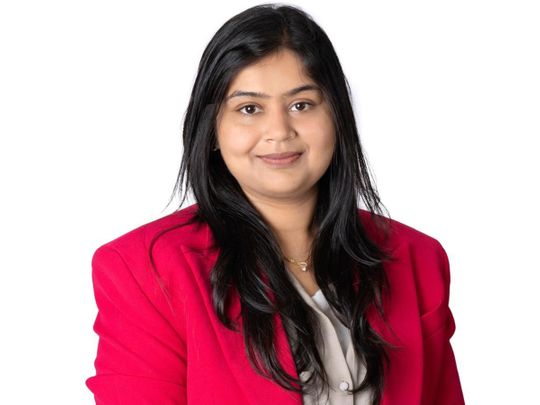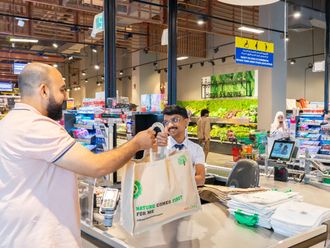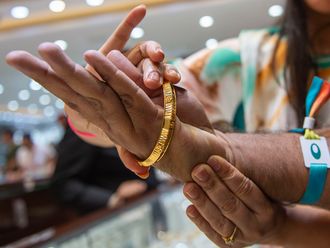
Dubai resident Purvi Munot is on a mission to make budgeting simple for newbie savers in the UAE. This is why the thrifty ex-banker not only quit her full-time corporate job last year, she went on to share her money skills by starting an app that helps others manage routine savings based on goals.
"I have a habit that for every Dh100 that I spend, I save Dh5. This is apart from the 20 per cent I keep aside when my income hits the bank account,” said Munot, who moved to Dubai at the end of 2020 with her husband. "While we both had decent salaries, we realised it was hard to save initially.
“So we adopted a 20:20:60 budgeting rule, allocating 20 per cent of our income towards investments, another 20 per cent towards savings, and the remaining 60 per cent towards utility bills, lifestyle expenses, and larger expenses like overseas trips or electronics purchases."
Setting aside savings for financial goals as a couple
The couple then started to earmark savings towards mid-term plans like upgrading the car and long-term goals like buying a new home, while exploring investments for retirement years that align with their long-term goals. These money learnings also got her to empathise with others in similar circumstances.
"Before entrepreneurship, I spent six months delving into people's challenges with money as we saw young families struggling with finances and needed money management tools. After identifying on-ground problems, we created a small non-tech prototype to see if it fixed problems,” Munot added.
Although these experiences inspired her to teach others how to do the same, her entrepreneurial plans also stems from being a prudent spender herself and the fact that she has been a consumer banker and payments consultant since 2015.
Before entrepreneurship, I spent six months delving into people's challenges with money as we saw young families struggling with finances and needed money management tools
Bringing in tech experience to a personal finance app
After completing her MBA, Munot worked for about 5 years at global banking giant Citibank until 2020, spearheading builds for consumer banking and payment products from scratch for firms like Indian digital payments portal Paytm.
“I joined MasterCard as a consultant in 2020, drawing Dh661,140 [$180,000] annually in my last position, which I left in 2022. I was first introduced to the Fintech ecosystem in the Middle East, when I joined their team based in Dubai in 2020," she said.
Munot’s consumer banking stint deepened her know-how of the payments industry and how to navigate regulatory environments in the region. So late last year, she decided to start out on her own to build a savings app for those not well versed in using their earnings to save for goals.
Saving right from childhood and invest early in life
Munot attributes her saving habits to lessons instilled in her right from her childhood. She particularly recalled how her parents encouraged her and her brother to save coins as kids, and also taught later as adults to routinely put 20 per cent of their monthly income in a “touch-me-not fund”.
"As kids, my brother and I were given a little pot where we would contribute a coin each every morning. Then we would open that pot at month-end and donate to a non-profit dedicated to animal welfare. It was our first lesson about empathy and savings together," said Munot.
"As we grew up, one saving pot grew into multiple pots where we would collect gift money from relatives and elders and spend it on gifts, treats and charity. That's how saving money became our habit."

I have a habit that for every Dh100 that I spend, I save Dh5. This is apart from the 20 per cent I keep aside when my income hits the bank account
Taking advantage of the ‘power of compounding’
Munot added it was such practices that made her think about her financial future and understand the need to diversify her investments across different assets, as this reduced the risk of her losses and ensured that she has a balanced portfolio that can weather fluctuations or any uncertainty.
“After understanding from a young age the importance of budgeting, saving, and being responsible with money, I learned to prioritise sustainability and long-term success over short-term gains, which has been instrumental in building a significant amount for retirement," she added.
By investing, she said she took advantage of the ‘power of compounding’, which is essentially an act of 'adding interest on interest’, meaning the amount you invest will generate earnings from both the initial investment and the earnings amassed from preceding periods, growing your wealth over time.
Using automation and rewards to help others save money
“I also learnt that success is not about making a lot of money but about making smart choices and being disciplined in managing your finances over the long term, which included closely tracking day-to-day expenses and regularly reviewing progress towards my goals,” she explained.
Munot said she personally benefitted from preparing an annual purchase calendar according to periods of promotional sale or offers, which helps her rein in any impulses towards overspending on purchases and search better for more discounts.
This is why her app, which has 50,000 users and 100-plus brand tie-ups, not only assists inexpert budgeters in keeping track of goals-based savings, but like her personal purchase calendar, the platform has similar personalised tools that uses automation and rewards to encourage savings.
I also learnt that success is not about making a lot of money but about making smart choices and being disciplined in managing your finances over the long term
Bootstrapping a FinTech business for the first few months
She bootstrapped her business for the first few months before recently raising funds from external investors. The initial investment was Dh183,650 ($50,000), which included the general cost of setting up, office space, first team, and tech resources, which Munot self-funded from her personal savings.
"Between me and my co-founder, we invested Dh293,840 [$80,000]. It was to get the ball rolling and comfort our incoming investors that we were committed," she said, while adding that the company was bootstrapped for the first few months before raising Dh2.8 million [$750,000] externally.
“This was the ‘pre-seed round’, i.e. earliest stage of start-up funding, led by ‘angel investors’ and ecosystem enablers. We also got credits and incentives from Microsoft, VISA, Mohammed Bin Rashid Innovation Fund (MBRIF), etc. We put Dh1.8 million of the funds so far towards business growth."
Significant costs goes into setting up a technology company
The business, registered in February 2022 in the Dubai International Financial Centre (DIFC), also included expenses like applying for a trade license, obtaining visas, medical insurance, and renting co-working desks.
“The cost of applying for a trade licence was approximately Dh15,000, and Dh7,500 was spent to obtain visas, medical insurance, and an Innovation Hub access card, and then the expense to rent co-working desks equated to the first 20 per cent of the initial investment,” Munot detailed.
“As a technology company, hiring an in-house technology team became a significant outlay, an early investment, followed by the costs of on boarding strategic partners, processors, card programs, among others.”
• Set aside the ‘burn’ (i.e. the amount of cash the company spends per month) for the next six months, so that the ‘operational runway’ is secured. (Runway refers to how many months your business can keep operating before it's out of money.)
• Carefully plan the ‘outlays’ (expenses incurred during the process of creating a new business) as salaries, cost of building the technology, setting aside a budget for marketing, etc. and don't spend if it is not necessary
What should a good business plan detail? Munot explains
Key lessons Munot learnt during her entrepreneurial journey included the importance of having a detailed business plan to share with relevant authorities, researching regulations of the place you are starting your company, and having initial savings to avoid financial stress during company setup.
“A good business plan must have clearly identified user needs, an outline of the tech journey of a user, projected financials and ‘outlays’ or expenses, and details of the team required to develop this project,” Munot said, while describing what new entrepreneurs starting out need to keep in mind.
“Our savings also played a crucial role in helping us cover initial expenses and avoid the need for external funding initially. We also kept our costs lean and only invested in essentials, especially at the onset."
‘Pay yourself first, set aside income before spending on purchases’ is the rule she lives by. Despite her frugal nature, the avid traveller said she still plans spends on planning trips after having travelled solo to 20-plus countries so far. Meanwhile, for the long term, Munot plans to stay invested in a mix of gold, stocks and bonds for now.








